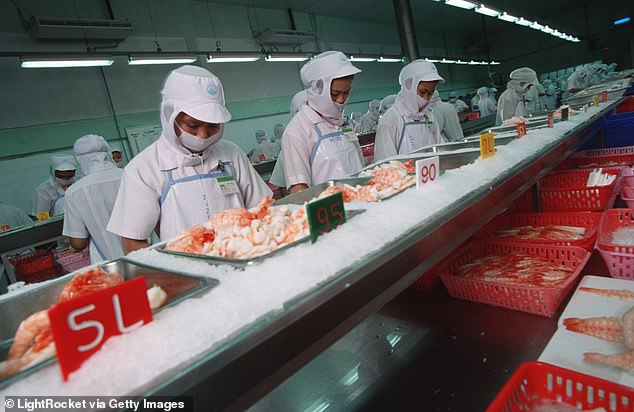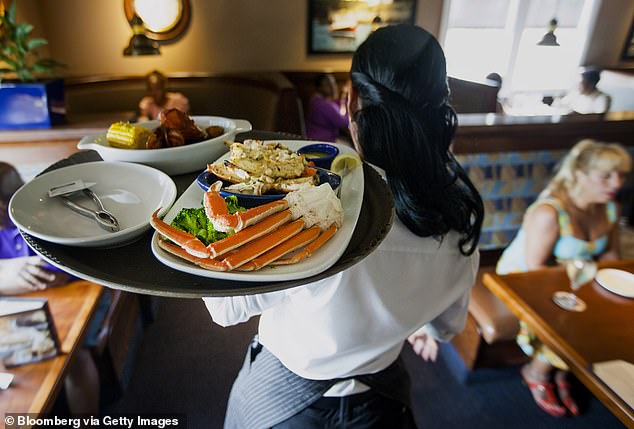Bankrupt Red Lobster announced its new owners on Monday, but also hinted that it may owe its parent company an exorbitant sum for millions of pounds of shrimp.
RL Purchaser LLC, an entity comprised of Red Lobster’s lenders, made the initial offer, which has so far not been challenged by any outside parties.
The troubled seafood chain filed for bankruptcy in May, days after closing nearly 100 restaurants in the United States.
There are already rumours that more closures will follow if landlords fail to renegotiate rents downwards.
Judge Grace E. Robson of the U.S. Bankruptcy Court for the Middle District of Florida will decide on July 29 whether the proposed sale can proceed.
Meanwhile, Red Lobster is saddled with about $300 million in debt, some of which is related to the 3.75 million pounds of shrimp it purchased from its current owner, Thai Union Group, according to a bankruptcy court filing by Thai Union’s lawyers.
Red Lobster to close another 100 restaurants if it can’t renegotiate cheaper rent

Endless Shrimp started out at $20, but they were too popular and cost millions of dollars.
Thai Union, a Thailand-based seafood producer, estimates that this amount of raw shrimp is worth about $20.6 million.
This valuation was arrived at based on the value of the inventory itself, as well as costs associated with additional ingredients for the breaded shrimp, packaging, storage and interest still accruing on Red Lobster’s balance sheet.
Thai Union’s lawyers explain that throughout 2023, Red Lobster was “repeatedly increasing its anticipated demand” for shrimp, presumably to keep up with its $20 unlimited shrimp promotion it launched in June.
But demand changed in October last year when Red Lobster “unexpectedly and drastically reduced its forecast several times,” Thai Union said.
It was at that point that Red Lobster bosses realized their tragic mistake and decided to raise the price of the unlimited shrimp deal to $22 at select locations to recoup losses.
Thanks to reduced demand from its subsidiary, Thai Union says it has accumulated “an excess supply of approximately 5,850,000 pounds of 14/16 pre-breaded coconut and 21/23 pre-breaded large shrimp,” both customized items.
Red Lobster then reportedly ordered a significantly smaller amount of Calabash shrimp in November, another custom product, leading Thai Union to be left with another 1.6 million pounds of seafood.
Thai Union now claims that after Red Lobster’s debtors purchased all of these shrimp for $13.07 million, it is still owed “approximately $3,684,541 in related costs, including ingredients, packaging, storage and interest.”
In a June 28 filing, the debtors instead claimed they owed nothing, citing the joint supply agreement that Red Lobster and Thai Union signed in 2019.
Since Thai Union objected to the compensation amount proposed by the debtors, there will be a court hearing in August to resolve this debt dispute, but only after the sale to the lenders is completed.
Experts and even Thai Union executives have acknowledged that Red Lobster’s unlimited shrimp deal, a tactic it introduced in June with the intention of making it permanent, was a colossal miscalculation that sent the company into financial insolvency.

Workers at the Thai Union frozen food processing plant outside Bangkok clean and prepare freshly cooked shrimp
Thai Union chief executive Thiraphong Chansiri, 58, even said out of frustration that he would never eat lobster again after the bankruptcy.
Once customers discovered they could gorge themselves on as much shrimp as they wanted last summer, they set to work bleeding the restaurant dry.
A girl managed to eat 108 shrimp in four hours.
“I set a new record at my local Red Lobster, this is my biggest accomplishment in life,” the person explained in their video.
More people than the company expected began taking advantage of the offer, but instead of canceling it, management kept it running for six months, and the losses dwarfed the losses from the endless supply of crabs it had offered twenty years earlier.
In total, Thai Union has been forced to write down $500 million as it seeks to free itself from the financial anchor that is Red Lobster.

